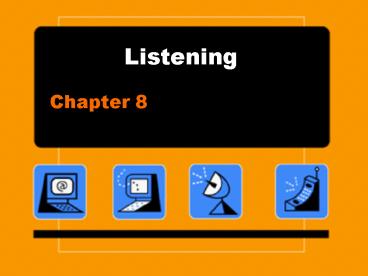Listening - PowerPoint PPT Presentation
1 / 23
Title:
Listening
Description:
It is basically a description of the psychological comfort level. It varies ... May be one-upmanship. Authentic Listening. Show genuine interest & sympathy ... – PowerPoint PPT presentation
Number of Views:57
Avg rating:3.0/5.0
Title: Listening
1
Listening
- Chapter 8
2
Listening
- Relational Climate is the level to which we feel
safe, supported and understood within a
relationship. It is basically a description of
the psychological comfort level. - It varies along a continuum.
3
Listening
- A confirming relational climate
- Is positive and supportive.
- We trust the other person.
- We have learned to count on him/her to listen and
understand us. - We expect him/her to confirm our thoughts and
feelings.
4
Listening
- A disconfirming relational climate
- Is defensive.
- Is characterized by negative judgments.
- Is characterized by mistrust.
- The other person imposes his or her judgment on
us. - This person rejects our thoughts and feelings.
- This person leaves us feeling wrong,
misunderstood, or unworthy.
5
Listening
- Rarely, if ever is a relationship completely
confirming. - The climate of a relationship evolves over time
and experience. - In most confirming relationships we feel
genuinely valued, accepted and respected. - This feel contributes to our psychological health.
6
Listening
- Levels of Confirmation
- Recognition
- notice a person silent treatment (power play)
- Acknowledgement
- acknowledge the persons thoughts, feelings or
actions vs. ignoring (not your feelings) - Endorsement
- accept the persons thoughts or feelings as
valid. - Agree (Do we always want to do this?)
7
Listening
- Basic Elements
- Hearing
- Attending
- Understanding
- Responding
8
Listening
- Internal Barriers to Listening
- Emotional noise
- Stress, anxiety, anger, or being in love
- Cognitive distraction
- Compartmentalize file it away temporarily
- Admit that you are distracted
- Premature judgment
- We think we know what is coming
- We already have an opinion
9
Listening
- External Barriers to Listening
- Noise
- Sensory adaptation
- Selective attention
- Related to introversion/extraversion
- Information overload
- Mental fatigue
- Multiple messages
- Message complexity
10
Counterfeit Listening
- Managing to look as if you are listening when you
are not - Pseudo-listening
- um-hum
- Nodding the head
- Defensive Listening
- Perceiving criticism when none is intended
11
Counterfeit Listening
- Selective Listening
- tuning in and out letting your attention
wander - Stagehogging
- Frequent interruption with your own story
- May be one-upmanship
12
Authentic Listening
- Show genuine interest sympathy
- Active listening showing interest through
verbal non-verbal responses
13
Controversial Listening Styles
- Advising
- Least helpful response
- People like to solve their own problems
- (I disagree.)
- Evaluating
- Judging instead of being supportive
14
Controversial Listening Styles
- Evaluating
- Judging instead of being supportive
- Appropriate when you are in a position of
authority - (Here your textbook implies that you should not
express your opinions. I disagree once again.)
15
Helpful Listening Styles
- Analyzing tentatively offering a different
perspective. - I wonder if. . .
- Questioning using open-ended questions
- How do you feel about this?
- Not to satisfy your own curiosity.
16
Helpful Listening Styles
- Minimally Encouraging
- Short cheerleading responses
- Supporting
- Validate the speakers feelings
17
Helpful Listening Styles
- Paraphrasing
- Reflective listening (reflects back to the
speaker like a mirror) - 3 components
- 1. How it sounds as if the speaker is feeling.
- 2. What you think the speaker might be thinking,
but has not said. - 3. Encourages the speaker to continue.
- Is that right?
18
Summary of Styles
- Advising
- Evaluating
- Analyzing
- Questioning
- Minimally encouraging
- Paraphrasing
19
Gender Listening
- Men are sensitive to status authority.
- They like to demonstrate competence.
- Women are concerned about harmony in
relationships. - They take a more empathetic approach to listening.
20
Gender Listening
- Classic example Woman is feeling frustrated at
work and tells her husband. He quickly offers a
solution. She gets angry. He gets his
feelings hurt, feels rejected or put down.
What happened?
21
Gender Listening
- She wanted to know if he understood how she felt?
- She is smart, and can solve her own problems.
- She has not finished talking and he has cut her
off. - Some of his suggestions are irrelevant, because
he did not wait to hear the whole story.
22
Gender Listening
- He is frustrated.
- He was listening, just like she wanted him to.
- His solution has been rejected.
23
Application
- What are your goals?
- Listening to give help or get information
- What are your limits?
- How much time and interest do you have?
- Consider the speakers needs.
- You can ask.
- Minimize distractions.
- Mentally summarize key ideas.































